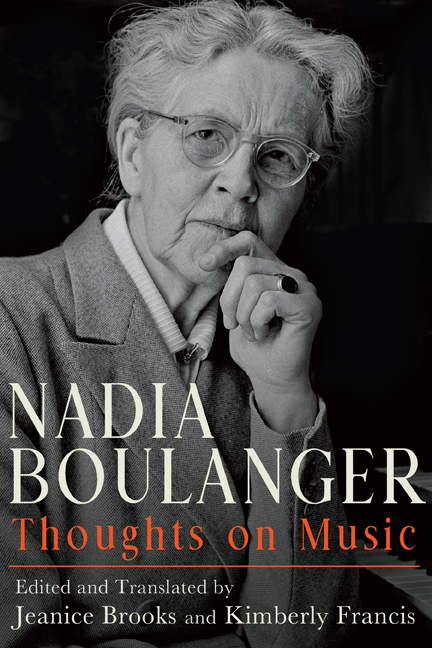Book contents
- Frontmatter
- Contents
- List of Illustrations
- Acknowledgments
- Editorial Apparatus and Critical Notes
- Note on Translations
- List of Abbreviations
- Timeline of Nadia Boulanger’s Life
- Introduction
- Part One Journalism, Criticism, Tributes
- Part Two Lectures, Classes, Broadcasts
- Bibliography of Nadia Boulanger’s Published Writing
- General Bibliography
- Index
“L’Heure Espagnole,” Le Monde Musical 32, nos. 23 and 24 (December 1921): 382-83 (excerpt)
Published online by Cambridge University Press: 15 October 2020
- Frontmatter
- Contents
- List of Illustrations
- Acknowledgments
- Editorial Apparatus and Critical Notes
- Note on Translations
- List of Abbreviations
- Timeline of Nadia Boulanger’s Life
- Introduction
- Part One Journalism, Criticism, Tributes
- Part Two Lectures, Classes, Broadcasts
- Bibliography of Nadia Boulanger’s Published Writing
- General Bibliography
- Index
Summary
Concerts Reviewed
December 1921
L’Heure espagnole, Maurice Ravel
It is impossible to imagine a play more subtly written or more wittily accomplished than Mr. Franc-Nohain’s. The personalities are drawn in a few words and the respective situations of the characters are shown with a delicacy … that does not prevent clarity.
The first scene presents the clockmaker Torquemada, a ridiculous, svelte little man, and the muleteer Ramiro, a little dull and clumsy, but likeable and solid. The latter has come to have his watch repaired (leading to a hilarious speech), but the conversation of the two men is interrupted by Concepcion, Torquemada's wife. She reminds him that his duties as municipal clockmaker require his presence elsewhere. The way she speaks to him is enough to make understood in what paltry esteem she holds her husband, and for what reasons! Torquemada leaves, asking Ramiro to await his return. Annoyed by this inopportune presence, Concepcion thinks of having the placid and complacent muleteer move one of the two large clocks that frame the workbench into her bedroom. In fact, scarcely has he left, carrying one of them, but Gonzalve, a young poet awaited with determined and unconcealed impatience, arrives; he is soon hidden in the second clock by Concepcion, who hears Ramiro coming down and dreams up this ingenious means of arranging for herself the longed-for tête-à-tête.
And from this point onward, everything will revolve around the two clocks—one containing Gonzalve, and the other containing Inigo, the fat financier who has meanwhile arrived to pay his court—which will be carried in turn, again and again, with the same casualness by the indefatigable Ramiro, who, after having thus facilitated the successive and disappointing conversations between Concepcion and her suitors, will finish by climbing the stairs a final time, but … without a clock and accompanied by Concepcion!
Torquemada comes home in the meantime, and in his shop finds Gonzalve, a little speechless, and Inigo, who is prevented by his girth from getting out of the singular shelter that he had so much trouble getting into: he takes advantage of the situation in order to sell them the two clocks.
- Type
- Chapter
- Information
- Nadia BoulangerThoughts on Music, pp. 175 - 179Publisher: Boydell & BrewerPrint publication year: 2020



